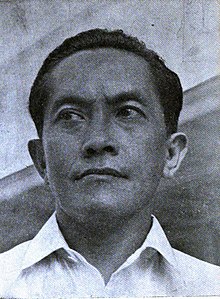Soenario | |
|---|---|
 Official portrait, c. 1954 | |
| 7th Minister of Foreign Affairs | |
| In office 1 August 1953 – 24 July 1955 | |
| Prime Minister | Ali Sastroamidjojo |
| Preceded by | Moekarto Notowidigdo |
| Succeeded by | Ide Anak Agoeng Gde Agoeng |
| 3rd Indonesian Ambassador to the United Kingdom | |
| In office 1956–1961 | |
| Preceded by | Soepomo |
| Succeeded by | B.M. Diah |
| Other positions | |
| 1960–1972 | Rector of the Syarif Hidayatullah State Islamic University Jakarta |
| 1960–1963 | Rector of the Sunan Kalijaga State Islamic University |
| Personal details | |
| Born | 28 August 1902 Madiun, Dutch East Indies |
| Died | 18 May 1997 (aged 94) Jakarta, Indonesia |
| Political party | Indonesian National Party |
| Spouse |
Dina Maranta Pantauw
(m. 1930; died 1994) |
| Children | Sunaryati Hartono, Astrid Susanto, Sunardien, Wuryastuti Sunario, and Irawan Sunario |
| Relatives | Dian Sastrowardoyo (Grandniece) |
| Profession | |
Soenario Sastrowardoyo (EYD: Sunario Sastrowardoyo; 28 August 1902 – 18 May 1997), more commonly known simply as Soenario, was an Indonesian politician, and diplomat, who served as the 7th Foreign Minister of Indonesia, from 1953 until 1955, during the First Ali Sastroamidjojo cabinet, under Prime Minister Ali Sastroamidjojo. He was one of Indonesia's leading figures during the Indonesian independence movement and served as an administrator for the Perhimpoenan Indonesia association in the Netherlands.
He was born in Madiun, East Java, Indonesia, on 28 August 1902. He started his education at the Frobelschool, before continuing to Europeesche Lagere School (ELS) and later to the Meer Uitgebreid Lager Onderwijs (MULO). He then continued to the Rechtshoogeschool in Batavia and later the Leiden University in Leiden. While studying in the Netherlands, he was active in the management of the Perhimpoenan Indonesia association.
Upon his return from the Netherlands, he began practicing as a lawyer, and assisted in the Indonesian independence movement. After the Declaration of Independence of Indonesia, he was a member of the Central Indonesian National Committee (KNIP). Following the end of the Indonesian Revolution, he continued to serve in government. He served as Minister of Foreign Affairs of Indonesia from 1 August 1953 until 12 August 1955, and as Ambassador to the United Kingdom from 1956 until 1961. He later became a Professor in political science and International Law at Diponegoro University. He died on 18 May 1997 in Jakarta.